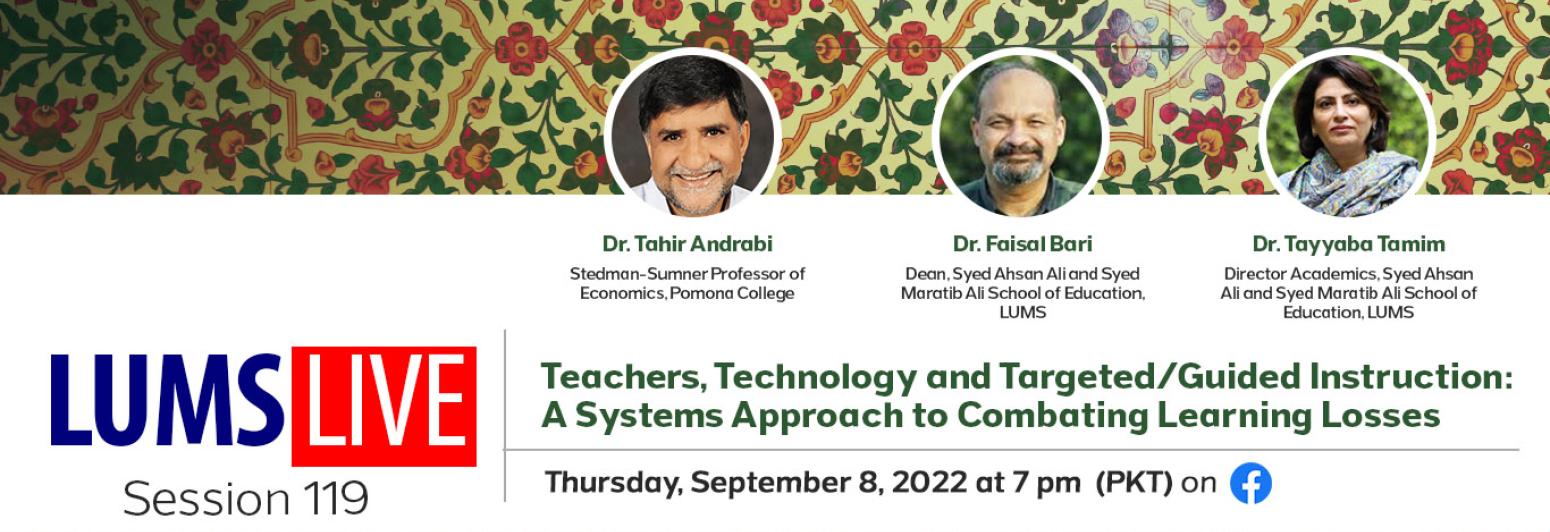
September 8, 2022
Despite rising school enrolment globally, a severe student-learning crisis plagues most low-income countries. In rural Pakistan, only 27% of Grade 3 children can read a sentence in a local language, and less than 22% can perform simple arithmetic operations (ASER, 2020). Low average learning and high learning inequality have a fortiori worsened with COVID-19-related school closures that have disrupted the education of 1.2 billion children globally (Azevedo, 2020; Kaffenberger, 2020). The variation in parental capability to facilitate learning from home potentially exacerbates ‘within the classroom’ learning inequality. Teachers will find it difficult to keep all the children in a post-COVID classroom to learn at the same pace, leading many to possibly fall permanently behind with long-term implications for their education and life outcomes (Andrabi et al., 2020).
To counter these losses, school systems are planning to implement remedial and accelerated programs to rebuild students’ foundational skills. CERP is implementing a large-scale experimental pilot of Targeted Instruction (TI) in 1200 KP public primary schools to test a) whether low-cost, simple technology can support teachers in implementing TI at reasonable scale and improving learning; b) the extent of variation across teachers in the costs and benefits of this technology and how that impacts take-up and learning outcomes; and c) how the perceptions of technology benefits change with experience.
The research-based intervention takes a systems view to focus on the teacher as an important actor in the child-learning ecosystem. It identifies frictions that teachers face in adoption of a new curriculum and pedagogy as well in the “take-up” of technology as an aid in this process. The large-scale pilot experiment alleviates some of these frictions and tracks the effect on classroom behavior as well as in student learning outcomes.
Hosted in collaboration with the Syed Ahsan Ali and Syed Maratib Ali School of Education (SOE), the session will be moderated by Dr. Faisal Bari and Dr. Tayyaba Tamim.
Join us for this interesting conversation!
About the Panelists
Dr. Tahir Andrabi
Dr. Andrabi has been a visiting scholar at MIT, a research associate at STICERD LSE and a consultant for the World Bank. He teaches classes in economic development, game theory, and empirical microeconomics. He is a co-founder and Director, Social Policy and Public Goods Program of the Centre for Economic Research in Pakistan (CERP). He was the inaugural Dean of the LUMS Syed Ahsan Ali and Syed Maratib Ali School of Education from 2017 to 2020. He has published extensively in major economics and education journals including the American Economic Review and Review of Economics and Statistics. Dr. Andrabi is a graduate of Swarthmore College and holds a Ph.D. in Economics from MIT.
Dr. Faisal Bari
Apart from his roles as Associate Professor at SOE and the School of Humanities and Social Sciences, Dr. Bari has also served as the Director of Academic Programmes at SOE. He is also a Senior Research Fellow at Institute of Development and Economic Alternatives (IDEAS). He has consulted for various multi-lateral and bi-lateral agencies including the World Bank, UNDP, DFID and the Asian Development Bank (ADB). His current teaching interests are in the areas of philosophy of education inclusion, economics of education, game theory, microeconomics and industrial organisation. He was also a columnist for the English daily, The Nation and he currently writes a bi-weekly column for DAWN. Dr. Bari obtained his BA (Honors) from the University of Oxford and BSc from Government College, Lahore. He has an MA in Philosophy from the University of Punjab and a Doctorate from McGill University.
Dr. Tayyaba Tamim
Dr. Tamim is currently also an Associate Professor at SOE. She is the Faculty Lead of the Pedagogical Partnership Programme at the LUMS Learning Institute. She has her PhD from University of Cambridge as a fully funded RECOUP scholar and MPhil RSLE (Research in Second Language Education Across Cultures) from Cambridge, UK as a British Council Chevening scholar. Dr. Tamim has led several funded research projects with national and international partners, including with USAID, British Council and the World Bank. She has also published and presented research papers at several national and international forums. Her work covers issues of social justice, equity and inclusivity in education.



















